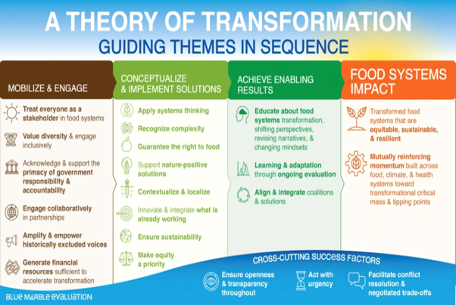

I’m Michael Quinn Patton (MQP) founder and director of Utilization-Focused Evaluation and Blue Marble Evaluation and a member of the Board of the International Evaluation Academy. This blogpost describes a synthesis of worldwide food systems dialogues that illustrates the kind of global thinking and engagement that constitutes a core part of the vision of the International Evaluation Academy.
The United Nations convened a Food Systems Summit in September 2021 as part of the Decade of Action to achieve the Sustainable Development Goals (SDGs) by 2030. All 17 SDGs, rely to some degree on healthier, more sustainable and equitable food systems. To build momentum toward the Summit, more than 1000 Independent Dialogues took place around the world involving more than 100,000 people. Dialogues could be convened by any interested group. A guidebook and training of conveners offered a standardized process for facilitation and a standardized reporting form. Independent Dialogues aimed to offer a seat at the table to diverse food systems stakeholders.
While the individual dialogue reports are publicly accessible, the question arose as to how to synthesize themes across the hundreds of reports. The Blue Marble Evaluation Network was invited to undertake this synthesis challenge. Bringing global thinking to synthesizing and integrating across silos and diverse perspectives is a core Blue Marble Evaluation principle, so we welcomed this opportunity.
Our Blue Marble Evaluation team coded the dialogue reports to capture and communicate cross-cutting themes. Transformation emerged as a major theme described as major, significant, deep, and broad changes beyond piecemeal reforms, incremental change, and narrowly focused projects. Participants spotlighted the urgency of sustainability and strengthening resilience so that humanity and nature thrive together. The themes were synthesized as a theory of transformation.

Dialogues provided guidance on transformation processes:
- Apply systems thinking. The food systems summit elevated attention on food systems.
- Recognize complexity as a fundamental food systems engagement principle.
- Guarantee the right to food. Dialogues emphasized that conceptualizing food as a right, rather than merely a market-based commodity, would provide a unified and universal framework for food systems transformation.
- Contextualize and localize. Dialogue emphasized localized food systems, in which different solutions will be needed for different contexts through place-based innovation and adaptation.
- Innovate and integrate what is already working. Change what needs to be changed, but also identify and build on what is working.
Many Dialogues discussed and supported “nature-positive solutions” — reducing damage to food ecosystems while making ecosystems thriving and resilient through sustainable approaches to agricultural production and human consumption like agroecology, regenerative agriculture, and organic farming.
Dialogues emphasized the importance of ensuring openness and transparency. Finally, dialogues called for all involved to act with urgency and to learn and adapt through ongoing evaluation.
While the focus of the Dialogues was on transforming food systems, participants recognized that climate change and the pandemic have had and are having major effects on food and agriculture. Therefore, it is essential to build global transformation momentum across systems because the potential for food systems transformation was inevitably and intrinsically tied to transformation of climate and health systems.
Rad Resources
- New 5th edition of Utilization-Focused Evaluation (2022) by Charmagne Campbell-Patton and Michael Quinn Patton with special attention to issues of equity and sustainability. https://us.sagepub.com/en-us/nam/utilization-focused-evaluation/book268943
Lesson Learned
Global evaluation engagement on global initiatives requires mobilizing global evaluation networks. The International Evaluation Academy creates and supports a network of globally-oriented evaluators who can take on independent evaluations of global initiatives like the UN Food Systems Summit.
The American Evaluation Association is hosting International Evaluation Academy (IEA) Week. The contributions to AEA365 this week are all related to this theme. Do you have questions, concerns, kudos, or content to extend this AEA365 contribution? Please add them in the comments section for this post on the AEA365 webpage so that we may enrich our community of practice. Would you like to submit an AEA365 Tip? Please send a note of interest to AEA365@eval.org. AEA365 is sponsored by the American Evaluation Association and provides a Tip-a-Day by and for evaluators. The views and opinions expressed on the AEA365 blog are solely those of the original authors and other contributors. These views and opinions do not necessarily represent those of the American Evaluation Association, and/or any/all contributors to this site.
